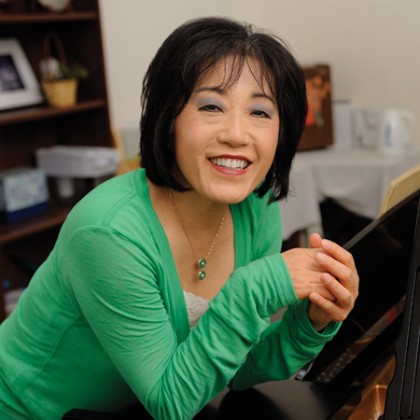Favorite designer: No favorite—whatever is in style and comfortable
Favorite pastime: Watching Ingmar Bergman films, particularly The Virgin Spring
Trivia: Does not own an iPod
You studied piano with Leon Fleisher at Peabody from 1977 to 1985, then taught at Michigan State University for 15 years before returning to Peabody in 2002. What is special about teaching at a conservatory?

Image caption: Yong Hi Moon, piano faculty at the Peabody Conservatory, has won top prizes in the Elena-Rombro Stepanow Competition in Vienna; the Gian Battista Viotti International Music Competition in Vercelli, Italy; and the Vianna da Motta International Music Competition in Lisbon, Portugal, and has received the Chopin Prize from the Geneva International Competition in Switzerland.
Image credit: Will Kirk / Johns Hopkins University
The atmosphere at a conservatory is very different from a large university. Students at Peabody have fewer academic requirements and they practice so much more. But practice alone does not make you a great artist. Here, it's up to my students to seek out courses that will make them an individual as well as a pianist. The Homewood campus offers great opportunities to take classes and interact with students who are not musicians. But it takes a lot of effort to get out of the iron-gated pond here and see more of the university.
Are your Peabody students very competitive?
Yes, most of them are naturally competitive. Many come from competitive backgrounds; if they don't they will soon need to learn to rise to the challenge. When I interview prospective students I can immediately tell who will fit in. They will need to compete. They quickly start learning what competition is.
You are also quite striking and fashionable! Is appearance important to success on stage?
Thank you! To answer your question, self-expression and awareness of your physical body generally is crucial. I give self-presentation advice to my students, but in the larger context of being comfortable with one's own physical presence. These are work clothes and you have to feel comfortable in them. Concert dress is important and how to behave onstage is important. And fashion has to fit the personality of the performer. You don't just walk onstage looking like Cinderella.
So your teaching work is about the person as well as the playing . . .
Absolutely. Students learn the repertoire, romantic and classical. Once they learn technique and the concept of the technical approach to the keyboard, they must learn how to apply their own body structure to the instrument. What I try to bring out is the higher potential of the person. Let's say the student has incredibly small hands. I help them understand that they can still reach. They have power. For everyone the proportions are different—fingers and palm, the upper and lower arm—it all goes into the understanding of their own relationship to the instrument and understanding themselves. They learn the ability to be themselves.
You've been winning competitions since you were 9 years old. Were you naturally competitive?
Oh yes. Plus my parents expected me to be at the top of the class. I was lucky to grow up with parents who recognized and supported excellence.
You have three grown children who are musicians. Did you expect this to happen?
I didn't want them to be musicians. But we took their musical education seriously and would drive often five hours regularly so they could take lessons with the teacher who was best for their musical development. They must have felt that music was very important. My son is the first violinist in the Jupiter String Quartet; one of my daughters is a cellist, and the other plays the clarinet.
What would you like to be doing in 10 years?
I would like to be teaching a little less and practicing a little more. The problem is that I love teaching. Students bring me energy. I'm still in touch with most of my former students. They call to ask me for advice—about marriage, children, how to survive in this competitive field. In the near term, I perform regularly. In December, in Korea, I performed Mozart's Concerto no. 25 in C Major, K. 503, with the Peabody Alumni Orchestra, and I gave master classes in Beijing. In early summer I will be performing a duo recital with my husband, [pianist/conductor] Dai Uk Lee, and another chamber recital in Korea.
Is your husband also well dressed?
Let's say when it comes to fashion, he is no Brad Pitt.

Hollis Robbins, A&S '83, is chair of the Humanities Department at the Peabody Institute; she teaches courses in literature, drama, film, and aesthetics. She has a joint appointment in the Center for Africana Studies at Homewood, where she teaches African-American poetry and civil rights.
Posted in Arts+Culture
Tagged music







